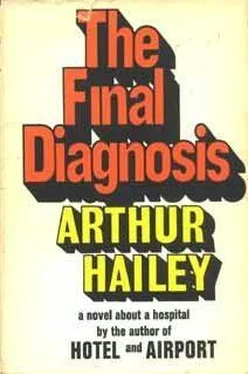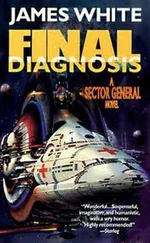Arthur Hailey - The Final Diagnosis
Здесь есть возможность читать онлайн «Arthur Hailey - The Final Diagnosis» весь текст электронной книги совершенно бесплатно (целиком полную версию без сокращений). В некоторых случаях можно слушать аудио, скачать через торрент в формате fb2 и присутствует краткое содержание. Жанр: Триллер, на английском языке. Описание произведения, (предисловие) а так же отзывы посетителей доступны на портале библиотеки ЛибКат.
- Название:The Final Diagnosis
- Автор:
- Жанр:
- Год:неизвестен
- ISBN:нет данных
- Рейтинг книги:4 / 5. Голосов: 1
-
Избранное:Добавить в избранное
- Отзывы:
-
Ваша оценка:
- 80
- 1
- 2
- 3
- 4
- 5
The Final Diagnosis: краткое содержание, описание и аннотация
Предлагаем к чтению аннотацию, описание, краткое содержание или предисловие (зависит от того, что написал сам автор книги «The Final Diagnosis»). Если вы не нашли необходимую информацию о книге — напишите в комментариях, мы постараемся отыскать её.
The Final Diagnosis — читать онлайн бесплатно полную книгу (весь текст) целиком
Ниже представлен текст книги, разбитый по страницам. Система сохранения места последней прочитанной страницы, позволяет с удобством читать онлайн бесплатно книгу «The Final Diagnosis», без необходимости каждый раз заново искать на чём Вы остановились. Поставьте закладку, и сможете в любой момент перейти на страницу, на которой закончили чтение.
Интервал:
Закладка:
In a way, she supposed, John was right. It was all very well to talk of making sacrifices and doing without things so that John could go to medical school. But when you came right down to it, it was hard to manage on any reduced income once you became accustomed to a certain standard. Take John’s salary at the hospital, for example. It certainly did not put them in the big brackets, but it had made their life together comfortable and they were able to enjoy small luxuries which a few months ago had been out of reach. Could they surrender those things now? Elizabeth supposed so, but it would be difficult all the same. Medical school would mean another four years of struggling, and even after that there would be internship and perhaps residency, if John decided to specialize. Would it be worth it? Weren’t they perhaps better off taking their happiness as they found it at this moment, accepting a role—even if a modest one—in the here and now?
That made sense, didn’t it? And yet, somehow, Elizabeth was still unsure. Should she still continue to urge John to aim higher, to enter medical school, at whatever cost? Dr. Coleman obviously believed he should. What was it he had said to John?—If you feel like this, and don’t go to medical school while you have the chance, it may be something you’ll regret the rest of your life. At the time the words had made a deep impression on Elizabeth and, she suspected, on John too. Now, remembering, they seemed more significant than ever. She frowned; perhaps they had better talk over the whole subject again tonight. If she were convinced of what John really wanted, maybe she could force him into a decision. It would not be the first time Elizabeth had had her own way about things that concerned them both.
Elizabeth put the sweeper away and began to move around the apartment, tidying and dusting. Now, dismissing more serious thoughts for the time being, she sang as she worked. It was a beautiful morning. The warm August sun, shining brightly into the small but comfortable living room, showed off to advantage the new draperies she had made and had hung last night. Elizabeth stopped at the center table to rearrange a vase of flowers. She had removed two blooms which had faded and was about to cross to the tiny kitchen when the pain struck her. It came suddenly, without warning, like a blazing, searing fire and worse, much worse, than the day before in the hospital cafeteria. Drawing in her breath, biting her lip, trying not to scream aloud, Elizabeth sank into a chair behind her. Briefly the pain went away, then it returned, even—it seemed—more intensely. It was as if it were a cycle. Then the significance dawned upon her. Involuntarily she said, “Oh no! No!”
Dimly, through the enveloping anguish, Elizabeth knew she had to act quickly. The hospital number was on a pad by the telephone. Suddenly the instrument on the other side of the room became an objective. Biding her time between each onset of pain, grasping the table for support, Elizabeth eased out of the chair and moved across. When she had dialed and a voice answered, she said, gasping, “Dr. Dornberger . . . it’s urgent.”
There was a pause and he came on the line. “It’s . . . Mrs. Alexander,” Elizabeth said. “I’ve started . . . to have . . . my baby.”
David Coleman knocked once on the door of Dr. Pearson’s office, then went in. He found the senior pathologist seated behind the desk, Carl Bannister standing alongside. The lab technician’s face had a taut expression; after a first glance he studiously avoided looking Coleman’s way.
“You wanted to see me, I believe.” Coleman had been returning from doing a frozen section on the surgical floor when his name had been called on the public-address system.
“Yes, I did.” Pearson’s manner was cool and formal. “Dr. Coleman, I have received a complaint concerning you from a member of the staff. Carl Bannister here.”
“Oh?” Coleman raised his eyebrows. Bannister was still looking straight ahead.
Pearson went on, “I understand you two had a little brush this morning.”
“I wouldn’t call it exactly that.” Coleman kept his voice casual and unperturbed.
“What would you call it then?” There was no mistaking the acidity in the old man’s tone.
Coleman said levelly, “Frankly, I hadn’t planned to bring the matter to your attention. But, since Mr. Bannister has chosen to, I think you had better hear the whole story.”
“If you’re sure it’s not too much trouble.”
Ignoring the sarcasm, Coleman said, “Yesterday afternoon I told both serology technicians that I planned to make occasional spot checks of laboratory work. Early this morning I did make one such check.” Coleman glanced at Bannister. “I intercepted a patient’s specimen before delivery to the serology lab and divided the specimen into two. I then added the extra sample to the listing on the requisition sheet, showing it as an extra test. Later, when I checked, I found that Mr. Bannister had recorded two different test results when, of course, they should have been identical.” He added, “If you wish, we can get the details from the lab record now.”
Pearson shook his head. He had risen from his chair and was half turned away; he appeared to be thinking. Coleman wondered curiously what would happen next. He knew that he himself was on perfectly secure ground. The procedure he had followed was standard in most well-run hospital labs. It provided a protection for patients and was a safeguard against carelessness. Conscientious technicians accepted lab checks without resentment and as a part of their job. Moreover, Coleman had followed protocol in telling both Bannister and John Alexander yesterday that the checks would be made.
Abruptly Pearson wheeled on Bannister. “All right, what have you got to say?”
“I don’t like being spied on.” The answer was resentful and aggressive. “I’ve never had to work that way before and I don’t figure I should start now.”
“And I tell you you’re a fool!” Pearson shouted the words. “You’re a fool for making a damn silly mistake, and you’re an even bigger fool for coming to me when you get caught out.” He paused, his lips tight, his breathing heavy. Coleman sensed that part of the old man’s anger stemmed from his frustration at having no choice but to support what the younger pathologist had done, much as he might dislike it. Now, standing directly in front of Bannister, he snarled, “What did you expect me to do—pat you on the back and give you a medal?”
Bannister’s face muscles were working. For once he appeared to have no answer. Surveying him grimly, Pearson seemed about to go on, then abruptly he stopped. Turning partly away, he gestured with his hand. “Get out! Get out!”
Without a word, his face set, looking neither to right nor left, Bannister went out of the room and closed the door behind him.
Now Pearson turned sharply to Coleman. “What the devil do you mean by this?”
David Coleman could see the burning anger in the old man’s eyes. He realized that the affair with Bannister was merely a preliminary skirmish. Determined not to lose his own temper, he answered mildly, “What do I mean by what, Dr. Pearson?”
“You know damn well what I mean! I mean by making lab checks—without my authority.”
Coleman said coldly, “Do I really need your authority? For something routine like that?”
Pearson slammed his fist on the desk. “Any time I want lab checks I’ll order them!”
“If it’s of any interest,” Coleman said, still quietly, “I happen to have had your authority. As a matter of courtesy I mentioned to you yesterday that I would like to do standard lab checks in Serology, and you agreed.”
Suspiciously Pearson said, “I don’t remember.”
Читать дальшеИнтервал:
Закладка:
Похожие книги на «The Final Diagnosis»
Представляем Вашему вниманию похожие книги на «The Final Diagnosis» списком для выбора. Мы отобрали схожую по названию и смыслу литературу в надежде предоставить читателям больше вариантов отыскать новые, интересные, ещё непрочитанные произведения.
Обсуждение, отзывы о книге «The Final Diagnosis» и просто собственные мнения читателей. Оставьте ваши комментарии, напишите, что Вы думаете о произведении, его смысле или главных героях. Укажите что конкретно понравилось, а что нет, и почему Вы так считаете.












